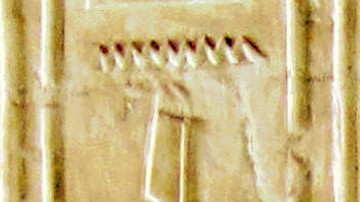Search
Search Results

Definition
Ancient Egyptian Government
The government of ancient Egypt was a theocratic monarchy as the king ruled by a mandate from the gods, initially was seen as an intermediary between human beings and the divine, and was supposed to represent the gods' will through the laws...

Image Gallery
A Gallery of 45 Administrative Centers of the Early Roman Empire
As the Roman Republic transformed into an empire that encircled the entire Mediterranean and cities across the provinces undertook Roman government functions, they also developed distinctly Roman features such as a Roman forum, Roman baths...

Definition
Narmer Palette
The Narmer Palette (also known as Narmer's Victory Palette and the Great Hierakonpolis Palette) is an Egyptian ceremonial engraving, a little over two feet (64 cm) tall and shaped like a chevron shield, depicting the First Dynasty king Narmer...

Definition
Narmer
Narmer (c. 3150 BCE) was the first king of Egypt who unified the country peacefully at the beginning of the First Dynastic Period (c. 3150 - 2613 BCE). He has also, however, been cited as the last king of the Predynastic Period (c. 6000 -...

Article
Games, Sports & Recreation in Ancient Egypt
Although the ancient Egyptians are often depicted as death-obsessed and dour, they actually had a great appreciation for life and their culture reflected their belief in existence as an eternal journey imbued with magic. Life was a gift from...

Definition
Anubis
Anubis (also known as Inpu, Inpw, Anpu) is the Egyptian god of mummification, funerary rites, guardian of tombs, and guide to the afterlife as well as the patron god of lost souls and the helpless. He is one of the oldest gods of Egypt, most...

Definition
Menes
Menes (c. 3150 BCE) is the legendary first king of Egypt who is thought to have united Upper and Lower Egypt through conquest and founded both the First Dynasty and the great city of Memphis. His name is known from sources such as Manetho's...

Article
Trade in Ancient Mesopotamia
Local trade in ancient Mesopotamia began in the Ubaid Period (~6500–4000 BCE), had developed into long-distance trade by the Uruk Period (~4000–3100 BCE), and was flourishing by the time of the Early Dynastic Period (~2900–2350/2334 BCE...

Article
Daily Life in Ancient Egypt
The popular view of life in ancient Egypt is often that it was a death-obsessed culture in which powerful pharaohs forced the people to labor at constructing pyramids and temples and, at an unspecified time, enslaved the Hebrews for this...

Article
Interrelations of Kerma and Pharaonic Egypt
The vacillating nature of Ancient Egypt's associations with the Kingdom of Kerma may be described as one of expansion and contraction; a virtual tug-of-war between rival cultures. Structural changes in Egypt's administration led to alternating...